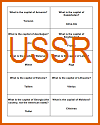Educational games can significantly enhance high school students' understanding of the end of the Cold War by making complex historical events interactive and engaging.
Strategy-based games like Cold War: The Game or simulation tools such as iCivics or Mission US allow students to take on the roles of world leaders, make diplomatic choices, and experience the consequences of political decisions firsthand.
These games help students grasp the intricacies of international relations, nuclear deterrence, and the shifting alliances that marked the Cold War's final years.
By participating in scenarios that mirror historical events--like the fall of the Berlin Wall or the dissolution of the Soviet Union--students develop critical thinking and empathy, making history feel more immediate and relevant.
Games also promote collaboration and discussion, encouraging students to analyze multiple perspectives and think like historians.
|








